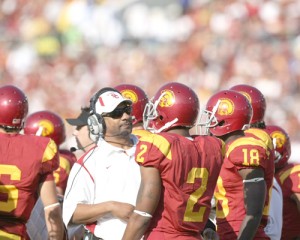Former USC coach’s lawsuit against NCAA drags on
Former USC running backs coach Todd McNair, the linchpin in the NCAA’s case against USC and Reggie Bush, wants to have his name cleared of any wrongdoing. But the NCAA is doing all it can to make sure that doesn’t happen.

Fighting back · Former running backs coach and special teams coordinator Todd McNair joined the USC coaching staff in 2004. McNair was an ace recruiter for the Trojans up until his contract went unrenewed in 2010. – Photo courtesy of USC Sports Information
The NCAA has been trying to keep 700 pages of documents concerning its investigation of USC and McNair under lock and key, while The New York Times and the Los Angeles Times have asked for the courts to disclose them to the public.
Last Wednesday, the NCAA argued that the documents should remain sealed, claiming that its investigation process would be compromised if the documents were made available to the public. The two major newspapers, meanwhile, referred to the First Amendment and California Rules of Court, arguing that “court records are presumptively open.”
A resolution between the two sides, either inside or outside of the courtroom, isn’t expected anytime soon.
When USC was punished in 2010 with a two-year postseason ban and lengthy scholarship reductions by the NCAA following alleged misconduct involving Bush’s recruitment, McNair was also banned from working for any NCAA school or contacting any potential recruits for one year. McNair hasn’t been able to find a job in football since he was punished by the NCAA.
The NCAA ruled that McNair had lied when he denied meeting Lloyd Lake, a wannabe sports agent who provided benefits to Bush. McNair appealed the decision and challenged the credibility of Lake, one of the NCAA’s key witnesses, but the NCAA appeals committee upheld the sanctions.
McNair then sued the NCAA in June 2011, seeking to recoup damages from supposed libel and slander, among a handful of other offenses.
Superior Court Judge Frederick Shaller’s decision to rule in favor of McNair this past November when the NCAA sought to have McNair’s defamation claims dismissed seemed to be heavily influenced by the documents at issue, according to reports.
Shaller, a USC graduate, wrote in his decision that emails written by NCAA enforcement personnel related to McNair’s case “tend to show ill will or hatred” toward McNair.
One NCAA employee called McNair “a lying, morally bankrupt criminal … and a hypocrite of the highest order,” in one email referred to by Shaller in his decision.
Shaller also said that the actions of NCAA investigators were “malicious,” “over the top,” and demonstrated “a reckless disregard for the truth.”
The sanctions bestowed upon USC and McNair have already been roundly disparaged by some members of the sports media.
In December of 2011, before Shaller ruled in favor of McNair in the initial trial, ESPN Pac-12 reporter Ted Miller wrote, “It’s become an accepted fact among informed college football observers that the NCAA sanctions against USC were a travesty of justice … That’s the take of all clear-thinking people.”
If the documents, which also include interview and deposition transcripts, do give substantial evidence to the claim that the NCAA unfairly targeted McNair, it’ll be another recent black mark for the NCAA, which has also come under fire for botching its investigation of the University of Miami. In January, the NCAA had to temporarily halt its investigation of Miami after admitting it improperly obtained information to look into alleged violations by the Hurricanes’ football and men’s basketball programs.
For its part, USC has attempted to keep quiet and move on from the infamous sanctions. All traces of Bush were removed from Heritage Hall in 2010, and the Trojans are only sanctioned for one more season.
In his ruling last fall, Judge Shaller did note that McNair had “demonstrated a probability of prevailing on the defamation claim.”
Though the school has kept its distance from the McNair lawsuit, USC Athletic Director Pat Haden has intimated at various times that the school would revisit contesting the sanctions if new information came to light.

I don’t recall any allegations about improper recruitment. The NCAA public report addressed institutional control, and ineligibility of student-athletes based on events that took place after enrollment. This is an important distinction that warrants correction.